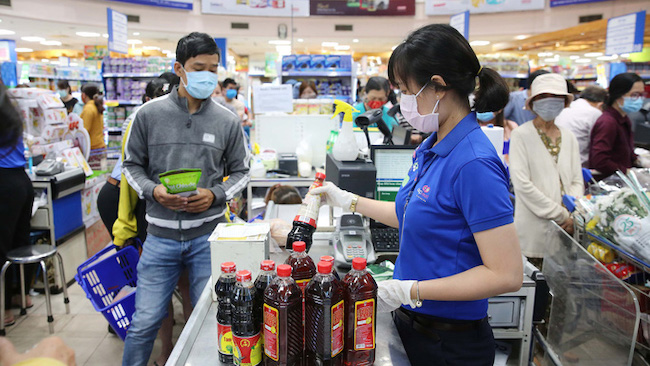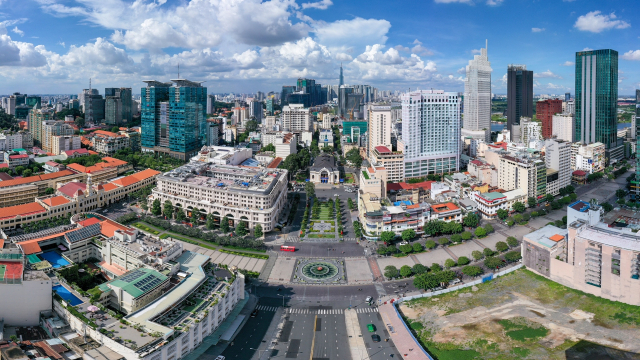Leader Talk
The rise of the use of blockchain and crypto in Southeast Asia
A recent Chainalysis report showing stellar growth in cryptocurrency adoption in Central and Southeast Asia (CSAO), making it the fourth-largest crypto market in the world, should come as no surprise.

According to the blockchain analytics firm, the region saw a 2 per cent growth in global market share between July 2020 and June 2021. Which may on face value does not sound significant, but this growth made CSAO the fourth-largest cryptocurrency market in the world, with over $572.5 billion in value sent during the year. This number represents 14 per cent of total global cryptocurrency transactions - and a growth rate of 706 per cent for the region for the year July 2020 to June 2021.
This rosy regional picture of Southeast Asian crypto development had a reality check when on September 24th, the People's Bank of China (PBoC) announced that all cryptocurrency transactions in China are illegal.
"Virtual currency-related business activities are illegal financial activities," the PBoC confirmed, warning it "seriously endangers the safety of people's assets". Is this a sign that crypto innovation in Southeast Asia is stalled, or are there good reasons for optimism despite the China ban?
"We will see an increasing exodus of Chinese crypto entrepreneurs, and I believe it will lead to a diffusion of crypto technology in Southeast Asia and accelerate the rise of Southeast Asia as a hotbed of crypto innovation," said Singapore-based Lily Z. King, writing in Forkast.
King suggested an upside to all the FUD caused by the ban, which will drive a significant decentralization of crypto power from China to other markets, particularly Southeast Asia.
“As the economy of Southeast Asia has been heavily impacted by the Covid-19 crisis, the new inflow of crypto capital and technology might bring a much-needed boost for their digital economy. Taking the long-term perspective, this diffusion is good for the builder-type among Chinese crypto entrepreneurs and is good for the crypto movement globally,” she concluded.
If that thesis is correct, what existing trends in crypto/blockchain are likely to simply accelerate, rather than jump-starting new innovation?
In the Chainalysis report, which to note looks wider than Southeast Asia to include central Asia and Oceania, there has been a marked growth in decentralized finance (DeFi) activity. From May 2020, DeFi activity (as a share of all transaction volume) skyrockets, reaching above 50 per cent by February. This activity is primarily driven by Uniswap, Instadapp, and dydx, with significant activity on Compound, Curve, AAVE, and 1inch.

But behind these insights what can we see in regional user and business adoption that can help understand the possible impacts of the China ban?
The island-state of Singapore is widely regarded as a leading force for crypto and blockchain adoption. According to a Hacker Noon article, there are 634 companies incorporated in Singapore related to crypto, with a total value of $8.3 billion according to CoinMarketCap.
Despite this existing activity, in late 2020, a new multi-million-dollar program was launched to strengthen Singapore's blockchain ecosystem. One of the program leaders, the Infocomm Media Development Authority (IMDA), said the need for such support was due to the lack of large-scale successful use cases outside the fintech sector which was hampering mainstream adoption.
"Its nascence means end-user companies have a lack of codified business models on how to work together using blockchain’s trusted environment. The industry is showing signs of silo-ed, specialized, blockchain solutions rather than interoperable network blockchains," said IMDA.
The IMDA also noted that support for startups seeking like-minded partners was lacking. While the Singapore Blockchain Ecosystem Report 2020, published at the end of last year, found that the coronavirus pandemic had accelerated the application of blockchain technology, used to verify health credentials.
A key driver for crypto businesses setting up shop in Singapore, independent of the latest China ban, is the regulatory clarity provided by the Monetary Authority of Singapore (MAS). And indeed, Singapore is already home to many Chinese crypto companies, including Binance, the world’s largest cryptocurrency exchange founded in China.
“Singapore provides the regulatory clarity with various regulations for different kinds of crypto activities (payment tokens, securities, custody, crypto fund management, etc.). Naturally, that would be attractive for any crypto companies, whether from China or elsewhere, to consider setting up shop in Singapore,” said Chia Hock Lai, co-chairman of Blockchain Association Singapore.
Consider the demographics of the region’s top six economies (Singapore, Indonesia, Malaysia, the Philippines, Thailand, and Vietnam) with a combined population of around 580 million, of which half are aged below 35.
Three key issues for economic rebound after lengthy lockdown
In terms of grassroots adoption of crypto, as opposed to business adoption in Southeast Asia, Vietnam not only tops the rankings for the region but for the world when calculated in terms of the transaction volumes for peer-to-peer (P2P) platforms.
As Chainalysis reported, for their 2021 global report, many residents use P2P cryptocurrency exchanges as their primary on-ramp into cryptocurrency, often because they don’t have access to centralized exchanges. Another reason given for the high uptake in Vietnam is the interest in gambling, which as its illegal gives a boost to demand for such activities through crypto-assets.
Southeast Asia also has a sizable unbanked population, primarily found in Indonesia, the Philippines, and Vietnam. Of the estimated 1.7 billion unbanked people today, 290 million live in the region. This is another contributing factor behind the high P2P uptake, certainly, it’s why Facebook’s crypto wallet Novi is predicted to have a high uptake in the region.
In the Philippines for example, 71 per cent of adults do not have a bank account, according to a 2019 report by the country’s central bank. And unlike the US where younger users have failed to drive Facebook adoption, in the Philippines, almost 33 per cent of the users are aged 18 to 24. This user profile is supported by figures from Metamask, with Filipinos making up a fifth of its ten million active monthly users - driven by the success of the NFT-based game Axie Infinity which allows people to earn by playing.
“The largest swath of gamers on the platform come from the island nation - a little more than 40 per cent - according to the powerhouse behind Axie Infinity, a Vietnamese startup called Sky Mavis,” according to Business Insider.
“The biggest driver for crypto over the next few years is not going to be DeFi, it’s not going to be opening up centralized exchanges. It’s going to be GameFi,” Brian Lu, partner at Headline Asia and Infinity Ventures Crypto, said in a recent Forkast report.
“GameFi is going to drive the crypto adoption in Southeast Asia and South Asia…blockchain games and a play-to-earn sector is what is going to take the adoption of non-crypto users and [turn] them into crypto users once they realize that they can earn more money or supplement their earnings with the game where they can play for two hours, three hours. It’s pretty crazy,” Lu confirmed.
The rich diversity of crypto adoption, whether successful crypto-based businesses or grassroots play-to-earn gamers, shows that there is great potential in Southeast Asia.
While Singapore in many ways is leading the way, the need as identified by the IMDA for interoperable network blockchains underlines that there has to be coordinated action from all stakeholders, to make Singapore the world’s leading user of decentralized technology, faced with the concerted efforts of the Chinese state to be the dominant blockchain power.
Whether it’s better serving the needs of the unbanked, or leading the way in the use of blockchain to spur medical research, the opportunities for innovation are there for the taking.
(*) Anndy Lian is an all-rounded business strategist in Asia. He has provided advisory across a variety of industries for local, international, public listed companies and governments. He is an early blockchain adopter and experienced serial entrepreneur, book author, investor, board member and keynote speaker.
Currently, he is appointed as the Chief Digital Advisor at Mongolia Productivity Organization, championing national digitization. He is also appointed as the Chairman, Asia for BigONE Exchange.
Hayat sets to make Vietnam its hub in ASEAN
Vietnam turns semiconductor vision into action
The global semiconductor industry is being reshaped by geopolitical tensions, shifting supply chains, and the surge of digital technologies.
Cutting red tape in APA approvals to speed up tax negotiations
The change in APA approval authority is expected to shorten processing time and enhance business proactiveness in international tax negotiations.
Enterprise cybersecurity is under threat from the inside
As hybrid cloud systems grow more complex, Vietnamese enterprises are struggling to detect cybersecurity threats moving laterally within their own networks.
Breakthrough for the international financial center ambition
The submission of the draft resolution on Vietnam’s international financial center to the National Assembly heralds a new developmental era for the country.
How leadership philosophy redefines hospitality in Nha Trang
More than just running a 5-star resort, Kristian Petersen is redefining the art of hospitality with a humane and sustainable leadership philosophy.
When organic becomes an inspiring wellbeing lifestyle
For Tyna Huynh, co-founder of Drinkizz, organic is not just a food choice but a way of life that fosters a deep connection between people, nature and community.
















.png)
.png)

























